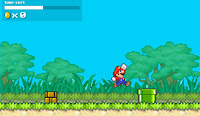There is much difference between game genres and their real life value for the player. Let's first take a look at the one that I believe has the lowest potential of teaching important skills: Arcade Games
 |
| Super Mario: the ultimate jump and run game |
My personal opinion is that there is much more real world value in the Role Playing Games genre. Here we will use the example of the best one of them all during my prime as a gamer: Diablo 2
 I very much
enjoyed clicking the mouse button countless times all over the screen to
defeat the next evil creature that crossed paths with me in Diablo 2.
However, using the mouse over your enemies, in that otherwise
excellent RPG, is a neat trick which gives the player just an illusion of
control. It doesn't matter how quickly you click the mouse button nor
how hard you click it. The hit points are calculated not on the player's
actions, but on the skills and equipment gathered previously in the
game. In addition to building confidence (like in the arcade games), the RPGs teach other very important character traits such as curiosity and patience, through making you seek, combine and carefully use items while carefully preparing for the next big encounter. The battles you pick and the enemies you choose to fight, teach another very important life lesson: taking calculated risks. However,
this genre still lacks presenting the player with any meaningful choices
that would affect the outcome of the adventure and would change the
narrative one way or another. In other words, this game is almost as
linear as the arcade jump and run games we discussed above.
I very much
enjoyed clicking the mouse button countless times all over the screen to
defeat the next evil creature that crossed paths with me in Diablo 2.
However, using the mouse over your enemies, in that otherwise
excellent RPG, is a neat trick which gives the player just an illusion of
control. It doesn't matter how quickly you click the mouse button nor
how hard you click it. The hit points are calculated not on the player's
actions, but on the skills and equipment gathered previously in the
game. In addition to building confidence (like in the arcade games), the RPGs teach other very important character traits such as curiosity and patience, through making you seek, combine and carefully use items while carefully preparing for the next big encounter. The battles you pick and the enemies you choose to fight, teach another very important life lesson: taking calculated risks. However,
this genre still lacks presenting the player with any meaningful choices
that would affect the outcome of the adventure and would change the
narrative one way or another. In other words, this game is almost as
linear as the arcade jump and run games we discussed above. |
| Warlords II |
 | |
| Warcraft II |
 |
| Heroes of Might and Magic V |
Before I finish this post, I feel obligated to mention another genre with a lot of potential that combines everything we discussed above and it adds another layer of real life experience. I am talking about the Computer Simulations. Their potential is great, because these games are supposed to recreate real life situations, but only a very limited number of products in this genre have achieved that to it's fullest extent. My applause here goes to Simon Read and his franchise New Star Soccer. It added a whole new dimension by showing the importance of social relationships with the boss, colleagues, friends, parents, spouse and kids, for achieving success at the ultimate goal: becoming a soccer star.
In conclusion, I would like to say that, by focusing on the visual and hearing satisfaction of the player, game developers have been failing to implement a very important element in their products: critical thinking. As Earl Nightingale pointed out in his recording "The Strangest Secret", when the late Nobel prize-winning Dr. Albert Schweitzer was asked by a reporter, "Doctor, what is wrong with men today?" the answer given was "Men simply don't think". Well, my personal opinion is that humans don't think, just because they are not thought to do so. See, games are failing not at the diversity of narrative (it is quite alright to have a linear story), they are failing at presenting the player with meaningful choices that would eventually affect the outcome of the adventure. This is exactly where Gamebook Adventures have always been strong at and we will discuss that in my next post:
The great potential of Gamebook Adventures and what is wrong with them
Peter Agapov
Game Designer at AugmentedRealityAdventure.com
President and Chief Executive Officer of American Limo Naperville
Former Road Captain of Marine One at Operation "Welcome You Home"
